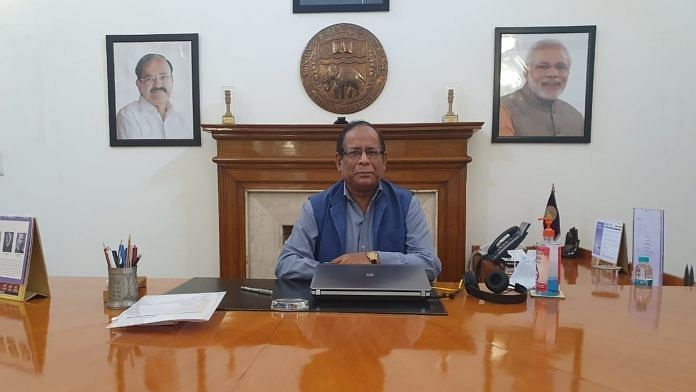New Delhi: The Delhi University’s new four-year undergraduate programme (FYUP), which is set to be implemented from the academic year 2022-23, will not be an unsuccessful endeavour like the 2013 attempt, DU Acting Vice Chancellor P.C. Joshi said in an interview to ThePrint.
According to Joshi, the new FYUP will provide flexibility to students in terms of course structure. Moreover, the university has a whole year to plan the programme outline to ensure that it is not rushed, as some faculty has alleged.
The DU Academic Council cleared the new FYUP earlier this week.
Under the 2020 National Education Policy (NEP), the FYUP allows for multiple entry and exit points, with a blended (online and offline) mode of learning and a bank of credits. This is unlike the design of the 2013 programme, which was discontinued within a year after the Narendra Modi government came to power, amid severe criticism and student protests.
“If someone is trying to equate FYUP of 2013 with the current FYUP then it would be unfair to do so. Then students did not have flexibility regarding the structure and in case of wanting to make changes they would have probably lost out on the entire degree in the FYUP of 2013,” Joshi told ThePrint.
“Now they have the option to stick to three years or go for a four-year programme if they want to do a research-based undergraduate programme. They have the freedom to make decisions under the umbrella of provisions that the NEP provides,” he said.
Joshi highlighted that the latest course is “student-centric, multi-disciplinary and holistic in its nature”.
“The students will not have to study unnecessary subjects and can shuffle their subjects according to their liking. For example if a Hindi majors student does not want to study English papers, then they can shuffle their subjects with the university’s prior permission,” he added.
“We have a year to prepare our course structures and plan the implementation. After being cleared by the Academic Council, the plan of implementation of FYUP has been shared with respective departments. They will now decide how to divide the coursework and what subjects to add,” Joshi said.
Also read: ‘Gruesome sexual content, Army in poor light’ — why DU removed 3 English texts from syllabus
Workload of teachers only stands to increase, Joshi says
Several teachers of the Delhi University Teachers Association (DUTA) have raised objections over the massive open online learning courses that the DU now aims to offer under the NEP provisions. They have also expressed concerns about the rushed implementation, and how the multiple exit route could lead to a decline in faculty hiring.
DUTA joint secretary and professor Prem Chand had earlier told ThePrint: “There are several problems with the FYUP but the most pressing concern is with the implementation of the ‘honours’ programmes. For mainstream commerce subjects, the workload will remain the same but for teachers of subjects like Hindi, English literature, political science the work might reduce.
“The culprit behind this is the exit option given to students, they might choose to drop out after two years, this may lead to a cap in the number of teachers hired,” he said.
The acting vice-chancellor has denied these apprehensions, saying that if anything, the workload of teachers stands to increase with the FYUP implementation.
“With the online learning modules and shuffling of subjects, the workload of teachers will not reduce. We have not taken out anything from the existing subjects, instead new courses like foreign languages, emotional learning etc. will be added to the programme,” he said.
On professors’ complaints of not being involved in the decision-making process and the rushed implementation, Joshi said, “We had put up the work that we were doing on the university website for a considerable amount of time. It was a discussion on an open forum, inviting suggestions from everyone. I think we have been very fair and democratic.”
The university also called for a 10-hour long standing committee meeting before taking the issue to the Academic Council Monday, he added.
Also read: Mother tongue, play-based activities, drama — new NCERT rules on prep module for children
New overseas campus plans now on back-burner
Earlier this year, Joshi had said the Delhi University was planning to start an overseas campus under the NEP provision provided to Institutes of Eminence, with Dubai (United Arab Emirates), Singapore and Mauritius under consideration.
However, owing to the hurdles thrown by the second Covid-19 wave, the plans have been put on a “back-burner”, said the acting vice chancellor.
“There are a lot of conditions and criteria that need to be fulfilled in order to set up an overseas campus. We have faced several setbacks due to the pandemic and have shifted our focus to helping universities grow within the country,” he said.
DU is now collaborating with 40 other universities across the country under the ‘Vidya Vistar Scheme’ to provide assistance and working knowledge to other universities across the country. The university has signed a Memorandum of Understanding with the newly-established University of Ladakh.
(Edited by Amit Upadhyaya)
Also read: Student-centric NEP will change society, Karnataka education minister says as state unveils policy



